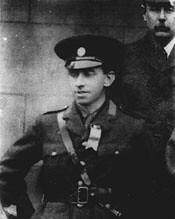Thursday, April 13, 2006
The seven signatories - Thomas MacDonagh
 "The fierce pulsation of resurgent pride that disclaims servitude may one day cease to throb inthe heart of Ireland - but the heart of Ireland will that day be dead. While Ireland lives, the brain and the brawn of her manhood will strive to destroy the last vestige of British rule in her territory"
"The fierce pulsation of resurgent pride that disclaims servitude may one day cease to throb inthe heart of Ireland - but the heart of Ireland will that day be dead. While Ireland lives, the brain and the brawn of her manhood will strive to destroy the last vestige of British rule in her territory"Thomas MacDonagh
Continuing United Irelander's focus on the seven signatories of the Proclamation of the Republic as we count down to this Sunday's military parade, today I will take a look at the poet, Thomas MacDonagh.
MacDonagh was born in Cloughjordan, Co. Tipperary. He had an interest in Irish heritage and the Irish language which led to him joining the Gaelic League. While staying on the Aran Islands he first encountered Padraig Pearse who he befriended along with Eoin MacNeill.
His friendship with Pearse and his love of Irish led him to join the staff of Pearse's bilingual St Enda's School upon its establishment in 1908, taking the role of teacher and Assistant Headmaster. Though MacDonagh was essential to the school's early success, he soon moved on to take the position of lecturer in English at the National University. MacDonagh remained devoted to the Irish language, and in 1910 he became tutor to a younger member of the Gaelic League, Joseph Plunkett. The two were both poets with an interest in the Irish Theatre, and formed a lifelong friendship.
In 1913 both MacDonagh and Plunkett attended the inaugural meeting of the Irish Volunteers and were placed on its Provisional Committee. He was later appointed commandant of Dublin's 2nd battalion, and eventually made commandant of the entire Dublin Brigade. Though originally more of a constitutionalist, through his dealings with men such as Pearse, Plunkett, and Sean MacDiarmada, MacDonagh developed stronger republican beliefs, eventually joining the Irish Republican Brotherhood. MacDonagh was asked by Tom Clarke to plan the grandiose funeral of veteran Fenian Jeremiah O'Donovan Rossa, which was a resounding propaganda success.
Though one of the seven leaders of the Rising, MacDonagh was a late addition to the group. He didn't join the secret Military Council that planned the Rising until April 1916, weeks before the Rising took place.
During the rising, MacDonagh's battalion was stationed at the massive complex of Jacob's Biscuit Factory. On the way to this destination the battalion encountered the veteran Fenian, John MacBride, who on the spot joined the battalion as second-in-command, and in fact took over much of the command throughout Easter Week, although he had had no prior knowledge and was in the area by accident.
All witnesses agree that MacDonagh was showing symptoms of intense strain as the fighting went on ('careworn and dishevelled' according to Peadar Kearney) and while he didn't question the authenticity of nurse Elizabeth O'Farrell's surrender order from Pearse, he did question its legitimacy saying that it might have been written under duress and that in any case he was not bound by the orders of a prisoner. Eventually after recomendation from two Capuchins, Father Aloysius and Father Augustine, MacDonagh agreed to recommend a surrender. MacDonagh's 4th Battalion had seen little fighting and his arguments to his men were low-key:
'Boys we must give in,' he said, 'We must leave some to carry on the struggle.'
Indigant volunteers shouted, 'We won't surrender to be shot like dogs', to which MacDonagh replied sadly, 'They may shoot some of us, but they can't shoot us all.'
There was an angry dispute over what to do and it is clear that MacDonagh's own military judgement was no longer entirely accepted but a key part in the restoration of control was the appearance of Major MacBride who accepted the fight was over for the time being:
'Liberty is a sweet thing', he advised, 'Any one of you that sees a chance, take it. You may live to fight again. If it ever happens again, take my advice and don't get inside four walls.'
As MacDonagh prepared to surrender he met with Rose McManners, Vice Commandant of the Inghinide branch of Cumann na mBan (and chief cook to the garrisson) who heard cheering as MacDonagh approached with Father Aloysius. According to her, MacDonagh was "hatless and unarmed, and looked old, weary and ill".
Thomas MacDonagh was court martialled and executed by firing squad on May 3rd, 1916, aged 38. William E. Wylie, a barrister who had been co-opted by General Maxwell's Deputy Advocate-General, Byrne, to conduct the prosecution of the rebels, stated that he felt MacDonagh's execution was "particularly unnecessary".
Thomas MacDonagh is generally credited as being one of the most gregarious and personable of the rebel leaders, a wit, a family man and someone who never had a bad word to say about anyone. He was a great friend of Francis Ledwidge, also a nationalist, who fought with the British Army in World War I. Ledwidge was himself killed at the age of 29 in the Battle of Ypres in Belgium but before his death he wrote this touching poem for his lost friend, Thomas MacDonagh:
Lament for Thomas MacDonagh
He shall not hear the bittern cry
In the wild sky, where he is lain,
Nor voices of the sweeter birds
Above the wailing of the rain.
Nor shall he know when loud March blows
Thro' slanting snows her fanfare shrill,
Blowing to flame the golden cup
Of many an upset daffodil.
But when the dark cow leaves the moor,
And pastures poor with greedy weeds,
Perhaps he'll hear her low at morn,
Lifting her horn in pleasant meads.
This Sunday let us remember this brave hero, Thomas MacDonagh.
© 2008 United Irelander.

